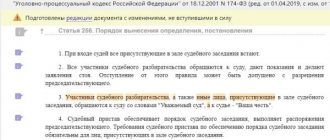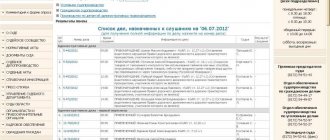The system of arbitration courts was created to resolve economic disputes arising from business activities. The main document defining the work of Arbitration Courts is the Arbitration Procedural Code (APC RF), adopted in 2002. The Code is regularly updated; at the time of writing, the latest changes related to the peculiarities of broadcasting meetings on radio and on the Internet were made in July 2021.
Arbitration courts hear cases in which the parties are: individual entrepreneurs, legal entities, government bodies (a more complete list is in Article 2 of the Arbitration Procedure Code of the Russian Federation).
How does a preliminary court hearing take place in an arbitration court?
The preliminary court hearing within the framework of the consideration of the dispute in the Arbitration Court is a separate court hearing. Every case in any court begins with such a hearing.
During the preliminary hearing, the court examines the circumstances of the case, asks questions to the participants in the case, explains non-obvious, but nevertheless important, shortcomings of the applicant’s or plaintiff’s claims, and shortcomings in the actions of the parties.
The preliminary hearing is one of the most important stages of legal proceedings, since it is during such a hearing that the court actually becomes familiar with the participants and circumstances.
Stages of the preliminary meeting:
- the court sets out the circumstances of the case: parties, requirements
- ascertaining the appearance of the parties and their representatives
- clarification of the availability of applications
- statement of the Plaintiff's claims
- statement of the Defendant's objections
Important:
- The preliminary hearing should be used for filing motions.
- The preliminary court hearing can flow into the main and final hearings within 1 hearing
- After the entry of new persons into the case, the change of judge, the trial of the case begins from the beginning, which means that a second preliminary hearing will be held
What is a settlement agreement between the parties?
A settlement agreement is an agreement between the parties to end a legal dispute on the basis of mutual concessions. The essence of the settlement agreement is to end the process by peacefully resolving the dispute, that is, achieving certainty in relations between the parties based on the will of the parties themselves.
Even at the stage of preparing the case for trial, the judge must take measures to reconcile the parties (clause 9 of Article 112 of the Arbitration Procedure Code of the Russian Federation) and find out whether the parties intend to end the process through a peaceful settlement of the dispute.
The arbitration court also takes measures to reconcile the parties in the preparatory part of the court hearing. By taking the initiative to peacefully resolve a dispute, the arbitration court thereby contributes to its resolution without government coercion and on terms mutually acceptable to the parties.
The parties have the right to conclude a settlement agreement only in cases of claim proceedings. It can be approved by any authority.
The law requires that the settlement agreement concluded by the parties be drawn up in writing (Article 121 of the Arbitration Procedure Code of the Russian Federation). The parties must sign it and submit it for approval by the arbitration court.
The conclusion of a settlement agreement, like any other administrative action of the parties, is carried out under the control of an arbitration court, which must each time check whether the settlement agreement submitted by the parties does not contradict the law and whether it does not violate the rights of other persons (Article 37 of the Arbitration Procedure Code of the Russian Federation). If these circumstances exist, the court must refuse to approve the settlement agreement.
On approval of the settlement agreement, the court issues a ruling, which sets out its terms in detail. By approving the settlement agreement, the arbitration court must terminate the proceedings in the case (Part 7 of Article 85 of the Arbitration Procedure Code of the Russian Federation). A complaint may be filed against the said ruling of the arbitration court (Part 4 of Article 86 of the Arbitration Procedure Code of the Russian Federation).
In terms of its procedural significance, a court ruling on approval of a settlement agreement and termination of proceedings in the case is equivalent to a court decision and, in the event of failure to comply with it by the parties, is subject to forced execution. If there is such a determination, the plaintiff does not have the right to re-apply to the court with an identical claim.
The procedure for holding the main court hearing in the arbitration court
During the main court hearing, the court considers the case on its merits, taking into account all the evidence provided, petitions, explanations and testimony of persons participating in the case. At this stage, the trial is much more difficult to postpone.
It is during the main hearing that you will have to prove your position in court, interrogate your opponents in court as effectively as possible, and present the presented evidence in a way that will allow the court to make a decision in your favor. You should be prepared that, within the framework of the main legislation, the most important circumstances for the case are clarified; your procedural opponents will be the most active in this meeting.
The stages of the main court hearing are as follows:
- information is provided about the case currently being considered, the parties, the requirements
- the identity of the participants in the case and their representatives is established
- participants are informed about the results of petitions for the court to obtain information and documents, and other petitions of participants in the case
- the parties submit petitions, additions
- witnesses are questioned and additional evidence is presented
- the court may raise the question of ending the consideration of the case on the merits and moving on to debate, and making a decision
USEFUL : read how to behave in court using the link and watch the video
Simplified production
The arbitration process has another form of consideration - simplified proceedings. Its essence lies in the fact that materials are considered without calling the parties and without a preliminary meeting. The arbitrator examines the documents individually and renders a verdict within no more than two months from the date of receipt of the application.
All work is carried out through the “Electronic Justice” website (https://kad.arbitr.ru/). As a rule, litigation is considered in this way, where the amount of claims against legal entities is no more than 500,000 rubles, and for individual entrepreneurs no more than 250,000 rubles. A complete list of cases considered in this way can also be found in the Arbitration Procedure Code of the Russian Federation [11].
The parties submit all documents in PDF format through the court website. Having accepted the claim, the judge makes a ruling and gives the defendant a period to provide a response and evidence. At the same time, he sends the determination on paper indicating the access code to the materials to the plaintiff and defendant. This is done so that they can get acquainted with newly received materials directly on the site. If the defendant sends a response and other documents after the expiration of the period specified in the ruling, the judge will not accept them and will not consider them.
Based on the results of the consideration, the arbitration makes a decision, which is posted on the website and sent to the parties. The procedure for appealing a decision is also specified in the Arbitration Procedure Code of the Russian Federation [12].
Video conferencing in the arbitration court
Videoconferencing (VCC) is a method of conducting a court hearing through the use of video communication.
This opportunity to hold a meeting is used to allow a person who lives far from the venue of the hearing or does not have the opportunity to directly participate in the court to participate in the court hearing.
The HQS is organized on the basis of a petition from a person participating in the case. Such a petition must be submitted in advance, since the HQC in an arbitration court or a court of general jurisdiction is organized exclusively with another arbitration court, regardless of their jurisdiction.
Other features:
- Videoconferencing is carried out only if there is appropriate technical capability
- When using video communication, a video recording of the court hearing is carried out
- The use of videoconferencing in closed production is prohibited
Stages of the arbitration process
Stage 0. Pre-trial work
At the preliminary, zero stage, the plaintiff sends the defendant a pre-trial claim drawn up in a certain way. The specific list of categories of cases for which pre-trial work is mandatory changes periodically, so we will not provide it in this article.
Stage 1. Initiation of proceedings in the case
After pre-trial work is completed, a statement of claim is filed with the arbitration court. Before initiating legal proceedings, within 5 days the judge alone checks the application and attached documents (Article 127 of the Arbitration Procedure Code of the Russian Federation). The statement of claim must comply with the current requirements:
- be subordinate to the arbitration court in accordance with the requirements for jurisdiction
- have the necessary documents as attachments
- must be accompanied by paid state duty
- contain the circumstances of the case and requirements for the defendant with references to legislative norms
If the statement of claim is accepted, the arbitration court issues a ruling on the initiation of proceedings in the case. In addition to the actions that must be performed by the persons participating in the case, it must also contain the address of the Internet site, telephone numbers, and e-mail by which you can obtain information about the case under consideration. Copies of the ruling on acceptance of the claim by the arbitration court on this or the next day are sent to the parties to the case.
The statement of claim is not always accepted for consideration. If there are grounds, the judge may also:
- refuse to accept a claim
- leave the claim without progress
- return the statement of claim
Stage 2. Interview and preliminary meeting
The main court hearing on the merits of the dispute is not scheduled immediately. Before this, the court carries out preparatory actions:
- interview (Article 135 of the Arbitration Procedure Code of the Russian Federation)
- preliminary meeting (Article 136 of the Arbitration Procedure Code of the Russian Federation)
Preparing the case for trial
After reading the statement of claim, the judge calls the parties to clarify the circumstances of the case:
- offers to confirm demands/objections
- proposes to more fully disclose the evidence, provide additional confirmation
- resolves issues about the need for examination, witnesses, translators, new evidence at the request of the parties, etc.
- explains the rights and obligations of the parties, the consequences of actions
- resolves the issue of securing a claim
- sets the deadline for the submission of new documents and the date for the subsequent preliminary meeting
The preliminary work of the court is aimed at ensuring the correct and timely consideration of all circumstances at the subsequent main hearing.
Preliminary hearing
The parties to the case are notified of a subsequent preliminary hearing, where the case is heard by a single judge.
The parties have the right to participate in a preliminary hearing via video link (Article 153.1 of the Arbitration Procedure Code). If the plaintiff or defendant has been duly notified but fails to appear, the hearing will be held in their absence.
At a preliminary meeting, the sufficiency of the evidence presented is decided, the parties present their arguments, and the other party may require new evidence.
Stage 3. Main sessions
After presenting the necessary evidence and holding a preliminary hearing, the main meeting of the arbitration court is scheduled (Article 153 of the Arbitration Procedure Code of the Russian Federation), at which the case is considered on the merits.
The parties to the trial are required to be notified of the time and place of the hearing.
The procedure for holding a court hearing is strictly recorded (Article 154 of the Arbitration Procedure Code of the Russian Federation), and persons who do not comply with it may be removed from the hearing, as well as subject to a court fine (Chapter 11 of the Arbitration Procedure Code of the Russian Federation).
When judges enter the courtroom, everyone present in the courtroom stands up. All persons present in the courtroom shall listen to the decision of the arbitration court while standing. Persons participating in the case and other participants in the arbitration process address the arbitration court with the words: “Dear court!” They give their explanations and testimony to the court, questions to other persons participating in the case, and answers to questions while standing. Deviations from this rule may only be permitted with the permission of the court. The actions of persons present in the courtroom and carrying out filming, photography, video recording, and broadcasting of the court hearing on radio, television and the Internet, permitted by the court, must not interfere with order in the court hearing. These actions may be limited by the court in time and must be carried out in places specified by the court in the courtroom and taking into account the opinions of the persons participating in the case.
The judge or the presiding judge at the court hearing during a collegial hearing observes the following procedure (Article 153 of the Arbitration Procedure Code of the Russian Federation):
- opens the court session and announces which case is to be considered
- checks the appearance at the court hearing of persons participating in the case, their representatives and other participants in the arbitration process, establishes their identity and verifies their credentials
- establishes whether persons who failed to appear at the court hearing were properly notified and what information is available about the reasons for their failure to appear
- clarifies the question of the possibility of hearing the case
- announces the composition of the arbitration court, informs who keeps the minutes of the court session, who participates as an expert, translator, and explains to the persons participating in the case their right to challenge
- explains to the persons participating in the case and other participants in the arbitration process their procedural rights and obligations
- removes witnesses who have appeared from the courtroom before the start of their interrogation
- warns the translator of criminal liability for knowingly incorrect translation, the expert for giving a knowingly false conclusion, witnesses (immediately before their interrogation) for giving knowingly false testimony and refusal to testify
- determines, taking into account the opinions of persons participating in the case, the sequence of procedural actions
- finds out whether the plaintiff supports the claim, whether the defendant acknowledges the claim, whether the parties want to end the case with a settlement agreement or apply the mediation procedure, about which appropriate entries are made in the minutes of the court session
- leads the court hearing, provides conditions for a comprehensive and complete study of evidence and circumstances of the case, ensures consideration of statements and petitions of persons participating in the case
- takes measures to ensure proper order at the court hearing
Participants in the arbitration process can not only attend the meeting in person, but also use video communication (Article 153.1 of the Arbitration Procedure Code of the Russian Federation) if the court satisfies the previously filed petition.
A request to use video communication will not be granted if:
- the court does not have the technical capacity to carry it out
- the trial is held in closed court
After considering the dispute, the court makes a decision that either fully or partially satisfies the stated requirements, or refuses to satisfy them.
Stage 4. Review by the appellate court
If at least one of the parties does not agree with the decision made by the first instance, and this decision has not yet entered into legal force, it can file an application with the appellate authority (Chapter 34 of the Arbitration Procedure Code of the Russian Federation). The appeal is filed through the arbitration court that made the decision in the first instance, which is obliged to send it along with the case to the appropriate arbitration court of appeal within three days from the date the complaint was received by the court. An appeal cannot contain new claims that have not been previously considered in the arbitration court of first instance.
Similar to the consideration of a claim in the first instance, an appeal is filed with the Arbitration Court, where within 5 days the issue of its acceptance for proceedings is considered (Article 261 of the Arbitration Procedure Code of the Russian Federation) by the arbitration court of appeal.
The arbitration court of the appellate instance issues a ruling on the acceptance of the appeal, which initiates proceedings on the appeal. The ruling shall indicate the time and place of the court hearing to consider the appeal. In this case, the time for the first court hearing to consider the appeal is determined taking into account the fact that it cannot be scheduled earlier than the expiration of the period established by the Arbitration Procedure Code of the Russian Federation for appealing the relevant decision of the arbitration court.
Copies of the ruling are sent to the persons participating in the case within five days from the date of receipt of the complaint by the arbitration court of appeal.
If the appeal was not accepted for consideration, it may be:
- left motionless
- returned
- the appeal may be terminated
How the case is considered by the arbitration court of appeal
In general, the rules for considering a case by the appellate court coincide with the rules for considering a case by the first instance of the arbitration court with several features.
For example, an appellate court always considers a case not individually, but in a collegial manner. To avoid confusion, only one decision is considered in the appellate court:
- multiple requirements cannot be connected or disconnected
- the subject or basis of the claim cannot be changed
- the amount of claims cannot be changed
- counterclaim cannot be considered
- the responder cannot be changed
- new third parties cannot be involved
Stage 5. Consideration in the cassation instance
The next possible stage of arbitration proceedings is the cassation instance. A cassation appeal can be filed in the following cases:
- disagreement with the decision of the arbitration court of first instance that has already entered into force
- disagreement with the decision received in the appellate instance
- if the appellate court refused to restore the missed deadline for filing an appeal
A cassation appeal can also be filed with the Judicial Collegium of the Supreme Court of the Russian Federation, see stage 6.
How to file a cassation appeal (Article 275 of the Arbitration Procedure Code of the Russian Federation)
A cassation appeal is not filed directly with the cassation court, but through the arbitration court, which heard the case and made a decision.
Next, within 3 days, the cassation appeal with the attached materials is transferred to the arbitration court of the cassation instance.
Acceptance of a cassation appeal for proceedings by the arbitration court (Article 278 of the Arbitration Procedure Code of the Russian Federation)
After a concerning complaint is received by the arbitration court, the judge, within 5 days, makes a decision on the possibility of accepting the complaint for proceedings. If the requirements for form and content have been met, the court will issue a ruling to accept the complaint and initiate cassation proceedings. Copies of the ruling, including the place and time of the meeting, are sent to the parties to the case.
If the cassation appeal was not accepted for consideration, it may be:
- left motionless
- returned
- the cassation appeal was terminated
The procedure for considering a case by an arbitration court of cassation (Article 284 of the Arbitration Procedure Code of the Russian Federation)
In general, the arbitration court of cassation considers the case similarly to the arbitration court of first instance. The failure of one of the parties to appear upon proper notice is also not an obstacle to the consideration of the case. The main difference is the collegial composition of the judges.
Stage 6. Consideration of a cassation appeal in the Judicial Collegium of the Supreme Court of the Russian Federation
A cassation appeal can also be filed directly with the Judicial Collegium of the Supreme Court of the Russian Federation. The basis is disagreement with the following decisions:
- decisions and rulings of arbitration courts of constituent entities of the Russian Federation that have entered into legal force
- decisions and rulings of arbitration courts of appeal
- decisions and rulings of district arbitration courts adopted by them in the first instance
- rulings of arbitration courts of districts issued by them in the process of cassation proceedings, if judicial acts in respect of which the possibility of appeal to the arbitration court of cassation are provided for were appealed in the specified order
- resolutions and rulings of district arbitration courts adopted based on the results of consideration of the cassation appeal
That is, when one of the parties did not agree with the decisions of the first, appellate and cassation instances, it can fully or partially appeal them to the Supreme Court. Received judicial acts are contested if, in the opinion of a party, they contain significant violations of substantive law, or the procedure for consideration has been violated, which has led to a violation of the rights and legitimate interests of a party to the case in business or economic activity.
A cassation appeal is filed directly with the Supreme Court of the Russian Federation and may contain demands for the award of compensation.
The procedure for considering a cassation appeal submitted to the Judicial Collegium of the Supreme Court of the Russian Federation (Article 291.6 of the Arbitration Procedure Code of the Russian Federation)
The judge of the Supreme Court of the Russian Federation examines the cassation appeal, presentation based on the materials attached to them, or on the materials of the requested case.
The person filing a cassation appeal may petition to suspend the execution of the appealed judicial acts. Within 3 days, the judge makes a decision on suspension or refusal to suspend, then copies of the relevant decision are sent to the persons participating in the case.
For how long is the execution of a judicial act suspended?
- before the judge makes a ruling to refuse to transfer the cassation appeal
- before being presented for consideration at a court hearing by the Judicial Collegium of the Supreme Court of the Russian Federation
- for the period until the Judicial Collegium of the Supreme Court of the Russian Federation adopts a ruling based on the results of consideration of the cassation appeal, presentation along with the case
- deadline set by the judge
After considering the cassation appeal, the judge of the Supreme Court either refuses or transfers the complaint for consideration at a court hearing by the Judicial Collegium of the Supreme Court.
Powers of the Judicial Collegium of the Supreme Court of the Russian Federation based on the results of consideration of cassation appeals, presentations along with the case (Article 291.14 of the Arbitration Procedure Code of the Russian Federation)
Based on the results of consideration of a cassation appeal or presentation along with the case, the Judicial Collegium of the Supreme Court of the Russian Federation has the right to:
1) leave the decision of the court of first instance, resolution or ruling of the court of appeal or cassation without change, cassation appeal, presentation without satisfaction
2) cancel the decision of the court of first instance, resolution or ruling of the court of appeal or cassation in whole or in part and send the case for a new trial to the appropriate arbitration court. When sending a case for a new consideration, the Judicial Collegium of the Supreme Court of the Russian Federation may indicate the need to consider the case by a different composition of judges;
3) cancel the decision of the court of first instance, resolution or ruling of the court of appeal or cassation in whole or in part and leave the application without consideration or terminate the proceedings ;
4) leave in force one of the judicial acts adopted in the case;
5) cancel or change the decision of the court of first instance, resolution or ruling of the court of appeal or cassation and adopt a new judicial act, without transferring the case for a new trial, if an error was made in the application and (or) interpretation of substantive law;
6) award compensation for violation of the right to trial within a reasonable time or refuse to award it;
7) leave the cassation appeal or presentation without consideration on the merits.
When considering a case in cassation proceedings, the Judicial Collegium of the Supreme Court of the Russian Federation checks the correctness of the application and (or) interpretation of the norms of substantive law and (or) norms of procedural law by the arbitration courts that considered the case, within the limits of the arguments set out in the cassation appeal or presentation. In the interests of legality, the Judicial Collegium of the Supreme Court of the Russian Federation has the right to go beyond the arguments set out in the cassation appeal or presentation. At the same time, the Judicial Collegium of the Supreme Court of the Russian Federation does not have the right to check the legality of judicial acts in the part in which they are not appealed, as well as the legality of judicial acts that are not appealed.
When considering a case in cassation proceedings, the Judicial Collegium of the Supreme Court of the Russian Federation does not have the right to establish or consider as proven circumstances that were not established or were rejected by the court of first instance or appeal, or to prejudge questions about the reliability or unreliability of this or that evidence, the superiority of some evidence over others and determine what judicial act should be adopted upon a new consideration of the case.
The instructions of the Judicial Collegium of the Supreme Court of the Russian Federation, including on the interpretation of the law, set out in the ruling on the annulment of a judicial act, are mandatory for the arbitration court re-hearing the case.
Stage 7. Revision due to newly discovered circumstances
Judicial acts that have entered into legal force can also be reviewed by the Arbitration Court based on new or newly discovered circumstances (Article 309 of the Arbitration Procedure Code of the Russian Federation).
Arbitration courts reviewing judicial acts based on new or newly discovered circumstances (Article 310 of the Arbitration Procedure Code of the Russian Federation)
A decision, court order, ruling that has entered into legal force and adopted by the arbitration court of first instance is reviewed based on new or newly discovered circumstances by the court that adopted this decision, court order, ruling. When a decision in a case was made by the appellate, cassation, or Supreme Court of the Russian Federation, the review is carried out by the court that changed or adopted a new judicial act.
What circumstances are considered new or newly discovered (Article 311 of the Arbitration Procedure Code of the Russian Federation)
The newly discovered circumstances existed at the time the judicial act was adopted. These include:
- significant circumstances of the case that were not known to the applicant
- detection and confirmation of falsification of evidence, false testimony of witnesses, expert opinions, incorrect translation
- unestablished criminal acts of a party to the case, a representative or a judge committed during the consideration of the case
New circumstances are also significant for the case, but arise after the adoption of a judicial act. These include:
- cancellation of the judicial act that served as the basis for the considered case
- recognition of the invalidity of a transaction that entailed the adoption of an illegal or unfounded judicial act in this case
- recognition by the Constitutional Court of the law applied in the case as inconsistent with the Constitution of the Russian Federation after the applicant’s appeal
- decision of the European Court of Human Rights after the applicant's appeal
- determination or change in the resolution of the Presidium or Plenum of the Supreme Court of the practice of applying a legal norm, indicating the possibility of revising judicial acts that have already entered into legal force
Consideration of an application for review of a judicial act based on new or newly discovered circumstances (Article 316 of the Arbitration Procedure Code of the Russian Federation)
To review a court decision based on new or newly discovered circumstances, a party to the case submits a corresponding application to the Arbitration Court, which considers it in a court hearing within a month.
Judicial acts adopted by the arbitration court based on the results of consideration of an application for review of a judicial act based on new or newly discovered circumstances (Article 317 of the Arbitration Procedure Code of the Russian Federation)
After considering the application for reconsideration of the case, the court either refuses or grants it, accepting it for proceedings.
In case of cancellation of a judicial act due to new or newly discovered circumstances, the case is re-considered by the same arbitration court that canceled the previously adopted judicial act. After the judicial act is annulled, the arbitration court has the right to reconsider the case at the same meeting. A judicial act adopted as a result of a new consideration cannot be changed in the direction of worsening the position of the person held accountable for administrative or tax offenses, or public legal liability.
Stage 8. Enforcement proceedings
Execution of arbitration court decisions that have entered into legal force (Article 318 of the Arbitration Procedure Code of the Russian Federation). Typically, enforcement is carried out on the basis of a writ of execution issued by the court in an approved form.
0
0
0
0
0
Closed court hearing in arbitration
A closed court hearing is held if the subject of the case is information and information protected by special legislation of the Russian Federation.
Examples of closed trials:
- State secret
- Banking secrecy
- Notarial secret
- Attorney-client privilege
Peculiarities of consideration of cases in closed proceedings:
- Only persons directly related to the case participate in the case; the participation of witnesses and third parties is significantly limited
- All participants in the court are warned of responsibility for disclosing information that became known to them during the consideration of the case by the court.
- Keeping audio and video records is prohibited
- Persons participating in a closed meeting may only take written notes
- The court decision is made only in written form.
How to postpone a court hearing in an arbitration court?
The possibility of postponing a hearing in an arbitration court depends on the specific category of cases and the circumstances of the court hearing. For example, arbitration cases that last a long time, based on the procedures provided for by law, can be postponed quite simply.
However, in the event of repeated failure to comply with court requirements, a party to the case may be deprived of the opportunity to present evidence, make necessary motions, raise objections, etc. Thus, you should highlight the most important court hearings for you.
If the court is considering categories of cases that are not long-term, postponing the court hearing becomes a complex procedure.
Contents of the motion to postpone the trial:
- Name of the court, parties, case number in the arbitration court
- Statement of the circumstances of the case in court
- State the grounds for postponing the trial (inability to provide the requested document, inability to appear in court, etc.)
- Refer to legal norms that give you the right to ask the court to postpone the hearing
- In the pleading part of the petition, indicate the request to postpone the meeting
- Attach documents confirming the circumstances you have stated to your application.
- Signature and date
Preparing for an arbitration dispute
To file a claim in court, the plaintiff must first take pre-trial action. This usually involves forwarding the complaint to the defendant. The full list of pre-trial actions and the rules for their implementation is described in Article 126 of the Arbitration Procedure Code of the Russian Federation. If the claim is not sent to the defendant, the claim will be returned back to the plaintiff. This document must be drawn up in writing, strictly in the prescribed form. The statement of claim contains:
- name of the court;
- information about the plaintiff. For individual entrepreneurs, you need to indicate your place of residence, date and place of birth, address of state registration of entrepreneur status;
- information about the defendant. Similar to the previous point;
- listing of demands against the defendant(s). In this case, it is necessary to refer to specific provisions of the law. If there are several defendants, the claims must be stated in relation to each of them;
- the exact amount that the plaintiff wants to recover or appeal during the arbitration dispute;
- the cost of the claim, in cases where it is determined;
- confirmation that the pre-trial action has been carried out. Legally, this means that the plaintiff attempted to resolve the arbitration dispute without going to court, but the parties did not reach an agreement;
- a listing of measures taken by the court to protect rights to property before filing a lawsuit.
You will also need to attach many documents to your application. Each of them must be indicated in the claim. It can be:
- notification that a statement of claim and attachments thereto have been sent to all participants in the proceedings;
- a receipt indicating that the filing fee has been paid. Its amount is determined by Article 333.21 of the Tax Code of the Russian Federation. If the plaintiff has benefits for paying the state duty, petitions for its reduction, deferment of payment, this must also be supported by documents;
- documents confirming the circumstances due to which the arbitration dispute began;
- certificate confirming state registration of an individual entrepreneur or organization;
- If the interests of the plaintiff will be represented by a specially appointed person (lawyer), a power of attorney must be attached to the claim. This document must clearly state the powers of the representative;
- draft of the disputed agreement. If the arbitration dispute arose due to coercion to sign it;
- decisions of the arbitration court in similar cases, if any were found in Russian practice.
The claim for any arbitration dispute must be signed by the claimant. His representative can also do this. In this case, you must not forget to attach a copy of the power of attorney stating that a specific person will represent your interests with the right to sign.
Court hearing of the appellate instance under the Arbitration Procedure Code of the Russian Federation
Before the decision of the court of first instance comes into force, you have the right to file an appeal against the decision of the regional arbitration court.
Features of the appellate court:
- The appellate court considers the case based on the evidence presented to the court of first instance
- New evidence can be added to the case only if it is impossible to present it to the first court
- Violations of substantive and procedural law, taken together, are grounds for canceling the decision of the regional arbitration court
- The appellate instance may issue a new act on your case, cancel or uphold the decision of the first instance court, or send your case to the first court for a new trial.
- The decision of the arbitration court of the second instance comes into force immediately
Despite a number of significant differences, the parties to the case also have the right to exercise basic procedural rights: ask questions, give explanations, objections, participate in debates, etc.
MORE DETAILS : about appealing the decision of the arbitration court at the link
Help from an arbitration lawyer in Yekaterinburg
The law office “Katsailidi and Partners” has extensive experience in participating in arbitration cases of various categories. Taking this into account, we were able to form a significant base of positive judicial practice and methods for protecting the interests of our Clients in arbitration courts.
By contacting our Bureau, you will receive qualified legal assistance in the form of:
- Professional legal advice on your problem
- Drawing up statements of claim, responses, objections and petitions for various categories of arbitration cases
- Assistance in pre-trial dispute resolution
- Representation of your interests in court
- Assistance in initiating enforcement proceedings in your favor






